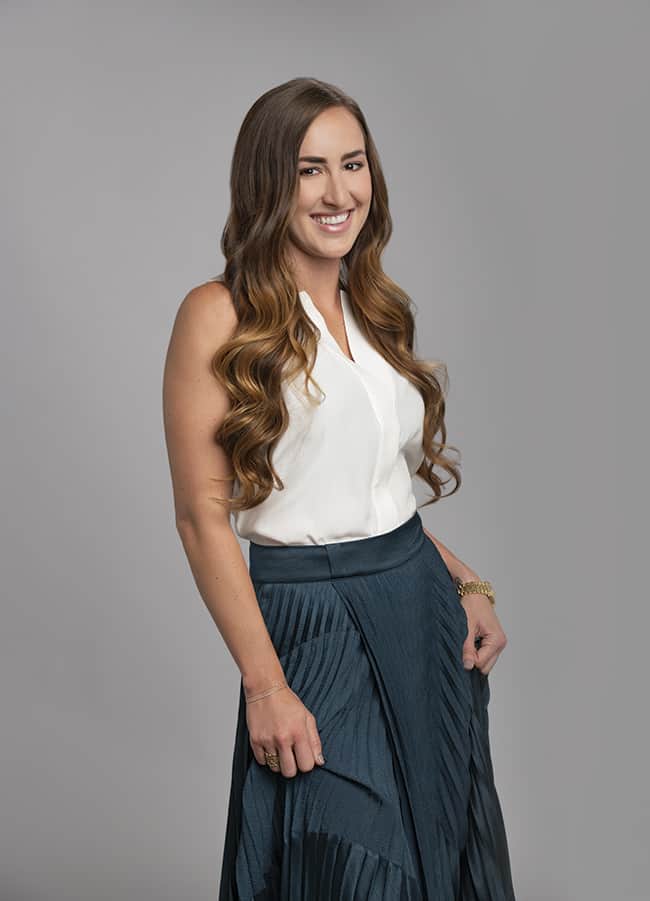Codie Sanchez is on a mission. Or maybe a half-dozen missions, and most of them are intertwined with cannabis, a plant she started to explore and invest in about five years ago in, of all places, Dallas.
While the majority of venture capital and angel investors are staying on the sidelines until cannabis is legal on the federal level, Sanchez and her colleagues at Entourage Effect Capital (formerly Cresco Capital Partners) are going all in. To date, they have invested more than $100 million across more than forty companies. Formerly an entrepreneur, venture capitalist, writer, and angel investor, she is now a managing director and partner at Entourage, as well as a board member at The Arcview Group, Magma Partners Venture Fund, and Texans for Veterans.
Like any millennial worth their salt in today’s business world, Sanchez also is a pro on the social media front. She uses Instagram, where she enjoys almost 40,000 followers, to promote cannabis events and speaking engagements. She also shares motivational memes and captions alongside snaps of her travels and free-spirited, hard-driving lifestyle: mountain climbing, surfing, jiu jitsu, boxing, shooting guns and bows, and for good measure, goat yoga.
More notable than her popularity on Instagram, though, is the way Sanchez connects with cannabis operators of all stripes and the upper echelon of investors. By bridging the gap between the two worlds, she quickly became an influential voice in an industry that often is wary of newbies and remains an enigma to most investors.
Creating generational wealth
Unlike other investors, Sanchez began her career as a journalist. One of her first assignments was a series about human trafficking and the struggle to survive along the U.S.-Mexico border. Despite winning a Robert F. Kennedy journalism award and grants from the Buffet Foundation, she reasoned writing wouldn’t change injustice. Money, on the other hand, can move mountains. In cannabis, Sanchez sees an opportunity to build an industry that has the potential to change the dynamics of cultural, political, and financial issues on a global scale.
“I’ve never seen anything like this industry, and I don’t say that based on just my experience,” she said. “The fascinating thing to me about cannabis is there is a melding of about five things happening at once.”
She listed the factors that make cannabis a unique, mesmerizing, and unpredictable industry: pent up demand for a currently illicit substance people have used for centuries, hyper-regulation of a new industry, a rapidly growing market where consolidation and exits are happening early and often, an evolving consumer base that includes an increasing number of seniors, and financial engineering designed to help the industry scale quickly without the help of traditional investment and banking resources.
Journalism was a fortuitous start to her career in business and finance, she said, because the skills she honed researching, analyzing, and interviewing people have helped her understand investors, business models, and the ever-shifting dynamics in a complicated, fast-moving commercial space. A voracious reader and student of history, she believes cannabis represents a once-in-a-lifetime investment opportunity.
“Those five factors got me interested in investing,” she said. “Put that on top of the fact we can do good with this and maybe eliminate opioid use. It’s why we call this a generational-wealth-creation event. My opinion is that everyone who can have investments in cannabis should, to your right risk tolerance. You are crazy to miss out on how this industry will integrate into our lives overall.”
While some of these factors make cannabis a compelling sector in which to operate and invest, some investors are wary of participating in a heavily regulated industry in constant flux with an abundance of inexperienced operators at the wheel. When Sanchez discusses the growing pains in the industry, she embraces the challenges and sees an opportunity to be a thought leader and influencer.
“There are a lot of conversations that need to happen in this industry, because there are really not many companies that are not startups,” she said. “Even if they’ve been around for a long time, given how constrained they have been for capital and the relatively small size of their revenue, these companies are still in startup stage.”
For Sanchez and her partners, at that point structure is all-important.
“For any company that has traction and revenue, it’s about how they structure exits, how they structure acquisitions, and how they value themselves,” she said. “I have seen a lot of these companies get burned by putting ridiculous valuations on themselves, and then they go out to raise their next round, the market gets squishy, and that means they aren’t able to raise at a higher level and they have to take a down route.”
Finding examples of companies that grew too big, too fast and ran out of cash along the way is easy. But the situation can be avoided, according to Sanchez, if leadership maintains a sound financial strategy that accounts for potential dips in the market and other contingencies.
“People don’t care about how you are performing as much as the macro movements in the market overall,” she said. “If I had one [piece of advice] for entrepreneurs about how they can keep control of their company, it would be the way you keep control is to make sure you always have the lifeblood of capital available to you. Don’t do things too early, because the market will punish you for the rest of your existence if you do that.”

The wild west, then and now
A quote on Sanchez’s personal website stands out: “The world wasn’t created or changed by the docile or the malleable. It was beaten into submission by the subversives, the dissidents crazy enough to try to transform it.” The words belong to her, and they sum up the philosophy of a woman whose family migrated from Spain during the Spanish Civil War of the 1930s and made their way to a rural area in northern Arizona. There, they fermented their own wine, hunted for food, and worked hard to build a new life in a country full of promise.
“It was a bit of the wild west [when I was] growing up, and my family had an attitude of individualism and [seizing] the opportunities here in the U.S.,” she said, noting her family encouraged her to think tough and work hard from an early age. “The stuff we focus on every day, like a meeting or getting fired, or even the 2008 financial crisis, none of those things will kill you unless you let them. So that attitude has served me well. I think the physical push and the little bit of wild-west attitude early on was the best gift I was ever given.”
After earning a Master of Business Administration degree from Georgetown University and a Ph.D. from Fundação Getúlio Vargas in Brazil, Sanchez set out to conquer the financial world. She led First Trust’s Latin America investment business and held positions at Goldman Sachs, State Street, and Vanguard. Along the way, she learned how to negotiate with the sharks and now passes along some of her wisdom to others. Throughout her career, Sanchez has balanced her professional ambitions with the social and political causes closest to her heart: helping veterans and motivating women, Latinos, and other minorities to aim higher with their job aspirations, investments, and life goals. A post on her website offers some blunt advice for negotiating salaries: “Negotiate like a girl, because you can get what you want. You will hands-down never get what you don’t ask for. This is especially true for women and minorities. There is much research that proves we don’t negotiate enough.”
Sanchez said Jack Mackay’s Conscious Capitalism: Liberating the Heroic Spirit of Business exerted a powerful influence on her early career, encouraging her to help create a more diverse and equitable business world. She sees the cannabis industry as an ideal platform to champion her views. The increasing number of B Corporations—for-profit companies that rate highly on B Lab’s scale for social and environmental performance—is a sign corporations are beginning to understand the importance of giving back to communities, she said. She advocates for investment in women-led startups through Plum Alley, WAVE, and The Vinetta Project.
“With every business I’ve run, I’ve made a point of hiring at least 50 percent minorities across the spectrum, whether that’s women, ethnic minorities, or people from different countries. And I don’t think that’s changed at Entourage,” she said. “We were really quiet before, and our first fund was very private; our second fund was more open. But now we are talking to our partners about diversifying the investors, and I am pushing to get more minorities and women and want a bigger push for Fund 3.
“I think we’re one of the only firms with female partners in the cannabis space, and this has been a big push for me since I joined,” she added. “There are a lot of ways to make money in this world, and at the end of the day you want to feel like we are not okay with process without a lot of purpose behind it.”
Giving people of color a stake in the industry, from top to bottom, is an important part of her mission. So far, she is not impressed with efforts to create social equity. Not one to mince words, she had some choice ones for the politicians and regulators who crafted the first round of social justice programs across the U.S.
“What a lot of regulators have done with social justice reform in cannabis is absolutely ludicrous,” she said. “In California, for instance, instead of giving a percentage of revenue for jobs and infrastructure and training programs, they want to have owners from an ethnically underprivileged background in certain area codes. So, they’re giving opportunities to just one individual instead of a community overall. They are also just giving them money without any learning or knowledge behind it. Unfortunately, I think most regulators are using cannabis as a platform for political games.”
A newbie with skin in the game
In 2014, as she was raising capital in Dallas and investing in her first fund, Sanchez acknowledges she was a newbie in terms of knowledge. But that didn’t stop her from diving right in. “We knew nothing, but the best way to learn about an industry is to put your money where your mouth is,” she said. “It’s always more compelling for me and I learn more quickly with skin in the game.”
A few years later, she became interested in post-traumatic stress disorder, from a non-profit perspective, and lobbied the government to allow veterans access to medicinal cannabis. She soon invested in several companies and began identifying key players across the country. As she dug deeper into the investment side of the cannabis industry, Sanchez noticed traditional investors often let their egos get in the way of deals.
“One thing people forget about in finance is that maybe you have had success and raised a ton of money in your career, but sometimes there comes a little bit of ego with that,” she said. “There are a lot of managers who come right out and say, ‘You are lucky to be with us,’ and they don’t show any humanity but just offer up a number. What they forget is people are not rational creatures. The only way we’ve survived all these millennia is through figuring out who to trust, what to trust, and what not to trust.”
While Sanchez considers herself a tough negotiator, she also respects the work cannabis entrepreneurs have put into their businesses and what a struggle surviving under constantly shifting regulations has been. With that in mind, she tries to make a personal connection when she meets with investors and business owners.
“Our success in the past has something to do with our returns thus far, but it has much more to do with the fact there is nothing I take more seriously than trust,” she said. “So, if you give me your money, I will take it and treat it like my own and will hopefully give you a return you won’t have to work for. I will do the work for you.”

The T word
Sanchez is equally outspoken about where she’s not interested in investing.
“It’s always good to cut out the noise of what we’re not interested in, so one thing is pure cultivation plays without anything else built around them,” she said. “The unique ability to create a product afterward makes it interesting. That’s pretty standard, because it’s farming, after all, and that won’t always be the most successful area.”
She also is skeptical of companies that want to build a business around “licensing land-grabs.” Those entities are putting an unrealistic value on the worth of specific licenses moving forward, she said. She’s also cautious about holding companies that are “rolling up varying businesses in one holding company or relying on [reverse takeovers].
“I do not like to invest in companies that don’t have a sustainable long-term difference, so I’m really not interested in the companies with thirty-day, sixty-day, or ninety-day exit plans,” she continued. “Usually, the get-rich-quick schemes are quite the opposite [of getting rich quickly], so I stay out of any opportunity that even smells like that.”
As for opportunities on the horizon, Sanchez pointed to important segments of the industry that haven’t been fully formed or formalized. “The areas I really like are multi-fold,” she said. “I’m really interested in who will figure out how to socialize cannabis in a similar vein to alcohol. I think the key to a lot of these companies is if they can get us not to change our habits very much but to substitute one thing for another thing—to create really incredible drinks at reasonable price points that won’t get you crazy-inebriated and where you can have an experience like sitting down with a glass of wine. I haven’t found a company I like, but there will be one eventually.”
She’s also looking for an investment in lab testing. Varying standards from state to state and a lack of formalized standards within states creates a void in credibility and consistency in a critical part of the supply chain. The situation needs to be addressed immediately, according to Sanchez.
“I would love to find a really strong grouping of lab-testing companies,” she said. “What we’ve seen thus far is a lot of lab companies out there, but they are riddled with issues. Testing is often inconsistent, and there is fraud. Nobody has put it all together to be an acquisition target. It’s a core part of the industry that’s really missing right now.”
Investment potential abroad is interesting, she said. She sees plenty of risk, but also windows of opportunity. In Latin America, she is exploring investment in countries with stable governments and “consistent economic regimes,” such as Chile and Colombia.
“There’s a reason Colombia and South America dominate flower production, because the growing conditions are ideal and you don’t need all the bells and whistles you have in most of the U.S.” she said. “Is it really reasonable that we’re building hundreds of thousands of square feet of warehouses with light bulbs to grow this sunshine-seeking plant in Canada in a tundra? I think, long-term, we’re going to see a lot of growing in Latin America, as we should.”
Even in somewhat stable countries, she explained, it’s important to have local operators who understand the government and, hopefully, are tied into it somehow. “I get nervous about Latin America, because the governments get in their own way—even in Mexico, which has every reason to get on board to legalize and for taking taxes back into the economy and fighting the narco regime,” she said. “There are a lot of opportunities there, but if you think the U.S. and Canada are volatile, hold on to your seatbelts because Latin America is an entirely different thing. There are a lot of firms going in there, and they don’t have the local talent and knowledge.”
While Sanchez keeps her eyes on the opportunities abroad, she is plenty busy at home. She recently took on a board role at The Arcview Group, where she focuses on helping the company evolve into a unique resource for the industry.
“We think Arcview is really important to this industry,” she said. “Founders Steve [DeAngelo] and Troy [Dayton] have been incredible advocates but haven’t blown it up and grown like they want to yet. They haven’t created the future Y combinator, where the angel list meets the premier cannabis event company, all integrated into one. If they do that, we can fund companies from seed to [initial public offering] and will be the only ones to be able to do that. It will be lucrative for our investors and also the industry.”
Investors are beginning to learn about the unique risks, challenges, and opportunities the cannabis industry presents. With no traditional metrics to rely on, it’s an abstract science, to say the least. Sanchez understands this all too well and communicates that message in every meeting she takes.
“When I sit down across from investors, it’s the transference of trust we try to show them—our career, our track record, and how much I personally have invested,” she said. “Believe in this story about the cannabis industry as a force that cannot be stopped. That story doesn’t know any gender or age.”












